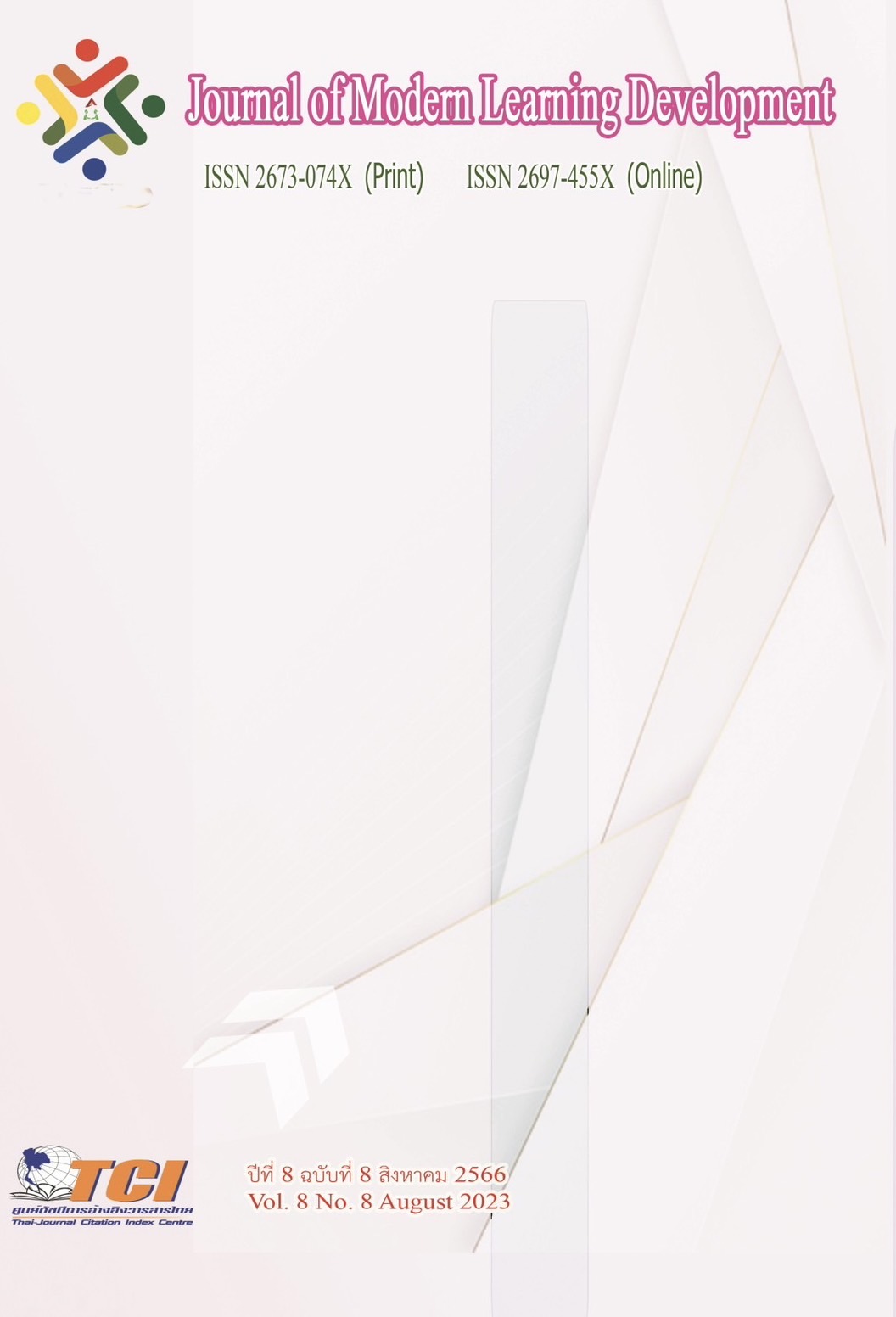Human Capital and Competency of Accountant in the Digital Age
Main Article Content
Abstract
In the world this day, where technology is rapidly changing by leaps and bounds, the obvious thing is that technological progress has lead us to the “Digital Age” This academic aims to present human capital and the competency development of accountant in the digital age. "Human capital" is knowledge, skills, adaptability and various experiences of human beings that are ingrained from birth and some come from learning, training and development at different stages of life. The accountant profession is considered one of the professions that are important to the organisation. which the accountant considered the first person involved in the preparation of financial information. The information provided by the accountant will be forwarded to the auditor, who gives assurance and certifies the financial statements of the organisation.Therefore, accountant in the digital age must have 6 important skills: 1) Accounting professional knowledge and skills 2) Accounting professional ethics 3) English language skills 4) Accounting laws 5) Accounting analytical thinking and problem solving 6) Information technology If the accountant is ready, which includes qualifications in the various skills mentioned above, will increase the value for the accountant. To be a quality accountant in the digital age, being a business partner is an important part that helps lead the organisation to survive. Help drive the direction for business success and have the ability to compete. That is violent in a time of rapid technological changes.
Article Details
References
กาญจนาพร รุจิโฉม. (2561). การสื่อสารภาษาอังกฤษของคนไทยกับการดำเนินชีวิตในศตวรรษที่ 21. วารสารศิลปการจัดการ. 2 (3), 199-210.
ชลิต ผลอินทร์หอม และ ไกรวิทย์ หลีกภัย. (2564). โมเดลการพัฒนาทักษะด้านอาชีพและทักษะด้านสารสนเทศทางการบัญชีต่อคุณภาพการสอบบัญชีของผู้ประกอบวิชาชีพบัญชีในยุคดิจิทัล 4.0 ในเขตกรุงเทพมหานคร. วารสารวิชาการมหาวิทยาลัยการจัดการและเทคโนโลยีอีสเทิร์น. 18 (1), 585-597.
ณัฐวุฒิ สิ้นเคราะห์ และ พรทิวา แสงเขียว. (2565). อิทธิพลของทักษะวิชาชีพบัญชีที่มีผลต่อความพร้อมในการทำงานด้านบัญชีนิติเวชของผู้ทำบัญชีในเขตกรุงเทพมหานคร. วารสารการบริหารจัดการและนวัตกรรมท้องถิ่น. 4 (3), 1-15.
ธนวรรณ แฉ่งขำโฉม และ ยุวัฒน์ วุฒิเมธี. (2562). ตัวแบบการจัดการการพัฒนาสมรรถนะของผู้ทำบัญชีที่มีประสิทธิภาพในสำนักงานบัญชีคุณภาพในประเทศไทย. วารสารวิชาการมหาวิทยาลัยธนบุรี. 13 (2), 78-91.
นิสดาร์ก เวชยานนท์. (2551). มิติใหม่ในการบริหารทุนมนุษย์. กรุงเทพมหานคร: คณะรัฐศาสตร์ สถาบันบัณฑิตพัฒนบริหารศาสตร์
นันทวรรณ บุญช่วย. (2563). ยุคพลิกผันทางเทคโนโลยีกับการพัฒนานักบัญชีนวัตกร. วารสารบริหารธุรกิจและสังคมศาสตร์ มหาวิทยาลัยรามคำแหง. 3 (1), 15-26.
บุษรา จันทร์ลอย,ชนันวริน โฆษิตคณิน และนิกข์นิภา บุญช่วย. (2565). ประสิทธิภาพการทำงานของผู้ทำบัญชีในธุรกิจนำเข้าและส่งออกที่จดทะเบียนในตลาดหลักทรัพย์ในประเทศไทย. วารสารสหวิทยาการมนุษย์ศาสตร์และสังคมศาสตร์. 3 (1), 139-152.
ประสุตา นาดี และคณะ. (2564). สมรรถนะของนักบัญชีในยุคดิจิทัล ; ทักษะการปรับตัวในโลกที่เปลี่ยนแปลง. วารสารศิลปะศาสตร์และวิทยาการจัดการ. 8 (2), 19-32.
ปราณี สคำมา, ณัฐวุฒิ ตันติเศรษฐ และวราพร เปรมพาณิชย์นุกูล. (2561). ความสัมพันธ์ระหว่างการพัฒนาสมรรถนะด้านวิชาชีพบัญชีกับประสิทธิภาพการปฏิบัติงานของนักวิชาการเงินและบัญชีมหาวิทยาลัยเทคโนโลยีราชมงคลอีสาน. วารสารสถาบันวิจัยและพัฒนา มหาวิทยาลัยราชภัฏมหาสารคาม. 5 (2), 53-62.
ผกามาศ บุตรสาลี, สุพัตรา รักการศิลป์ และเอมอร แสวงวโรตม์. (2565). ความสัมพันธ์ระหว่างคุณลักษณะของนักบัญชีที่คาดหวังและการปฏิบัติงานตามจรรยาบรรณวิชาชีพบัญชีกับคุณภาพข้อมูลทางบัญชีของนักบัญชีในสำนักงานบัญชีในเขตภาคตะวันออกเฉียงเหนือ. วารสารสหวิทยาการจัดการ คณะวิทยาการจัดการ มหาวิทยาลัยราชภัฏบุรีรัมย์. 6 (1), 28-44.
ราชบัณฑิตยสภา. (2564). พจนานุกรมศัพท์ศึกษาศาสตร์ ฉบับราชบัณฑิตยสภา. กรุงเทพมหานคร: สำนักงานราชบัณฑิตยสภา.
รัฐพงศ์ กาพย์เกิด, นวลละออ แสงสุข, อรทัย ชั้วเจริญ และวันชัย ปานจันทร์. (2563). การพัฒนาหลักสูตรฝึกอบรมเพื่อเสริมสร้างองค์ความรู้ด้านการบัญชีภาษีอากรสำหรับผู้ประกอบวิชาชีพบัญชี. วารสารวิจัยราชภัฏธนบุรีรับใช้สังคม สถาบันวิจัยและพัฒนา มหาวิทยาลัยราชภัฏธนบุรี. 6 (2), 82-99.
สภาวิชาชีพบัญชีในพระบรมราชูปถัมภ์. (2564). คู่มือประมวลจรรยาบรรณของผู้ประกอบวิชาชีพบัญชีรวมถึงมาตรฐานระหว่างประเทศเรื่องความอิสระ. กรุงเทพมหานคร: บริษัท แอคทีฟ พริ้นท์ จำกัด
สายฝน อุไร. (2565). ความสัมพันธ์ระหว่างการพัฒนาสมรรถนะวิชาชีพบัญชีกับความสำเร็จในการปฏิบัติงานของผู้ทำบัญชีสำนักงานบัญชีคุณภาพในเขตภาคตะวันออกเฉียงเหนือ. วารสารวิชาการ มหาวิทยาลัยราชภัฏบุรีรัมย์. 14 (1), 49-68.
สุกัญญา รัศมีธรรมโชติ. (2551). แนวทางการพัฒนาศักยภาพมนุษย์ด้วย Competency. กรุงเทพมหานคร : ศิริวัฒนา อินเตอร์พริ้นท์
Abdennadher, S., Grassa, R., Abdulla, H., & Alfalasa, A. (2022). The effects of blockchain technology on the accounting and assurance profession in the UAE : an exploratory study. Journal of Financial Reporting and Accounting. 20 (1), 53-71.
Barac, K., Plant, K., Kunz, R. & Kirstein, M. (2021), "Generic skill profiles of future accountants and auditors – moving beyond attributes", Higher Education, Skills and Work-Based Learning. 11 (4), 908-928.
Becker, S. G. (1992). “The economic way of looking at life.” Noble Lecture : (38-56).
Jackson, D., Michelson, G., & Munir, R. (2022). New technology and desired skills of early career accountants. Pacific Accounting Review. 34 (4), 548-568.
Leitner-Hanetseder, S., Lehner, O.M., Eisl, C. & Forstenlechner, C. (2021), “A profession in transition: actors, tasks and roles in AI-based accounting”, Journal of applied Accounting Research. 22 (3), 539-556.
Lynda Graton & Sumantra Ghoshal. (2003). Managing Personal Human Capital: New Ethos for the “Volunteer” Employee. European management Journal. 21 (1), February 2003. Printed in Great Britain.
McClelland, D. C. (1973). Testing for competence rather than for intelligence. New Jersey: American Psychologist.
Parry, Scott B. (1997). Evaluating the Impact of Training. Alexandria, Virginia: American Society for Training and Development.


